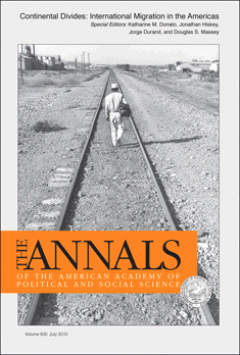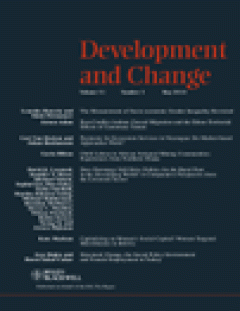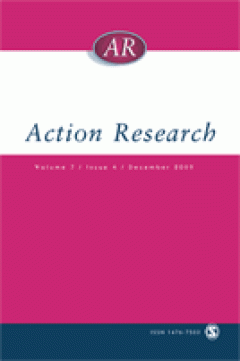Filter by

The Cumulative Causation of International Migration in Latin America
The theory of the cumulative causation of migration posits that as migratory experience grows within a sending community, the likelihood that other community members will initiate a migratory trip increases. This diffusion is expected to vary across time and place according to differences in the mechanisms guiding this behavior. The author compares the effect of the prevalence of migratory expe…
- Edition
- Vol. 630 no. 1. July 2010. pp. 162-177
- ISBN/ISSN
- 00027162
- Collation
- -
- Series Title
- The ANNALS of the American Academy of Political and Social Science
- Call Number
- -

Determinants of Emigration: Comparing Migrants’ Selectivity from Peru and M…
Although Latin American migrants to the United States, particularly Mexicans, are typically portrayed as poor and uneducated, some, such as Peruvians, are disproportionately well educated compared to those who never left their countries. This article examines who emigrates and why by comparing migrants� selectivity from Mexico and Peru. Using the Peruvian data of the Latin American Migration Pr…
- Edition
- Vol. 630 no. 1. July 2010. pp. 178-193
- ISBN/ISSN
- 00027162
- Collation
- -
- Series Title
- The ANNALS of the American Academy of Political and Social Science
- Call Number
- -

Assessing Human Capital Transferability into the U.S. Labor Market among Lati…
Scholars have questioned whether international migrants from Latin America are able to transfer their levels of education into the U.S. labor market. In this article, the author examines the data from the Latin American Migration Project for Guatemala, Mexico, Costa Rica, and Nicaragua to observe the ability of each of the immigrant groups to convert prior education into occupational attainment…
- Edition
- Vol. 630 no. 1. July 2010. pp. 196-204
- ISBN/ISSN
- 00027162
- Collation
- -
- Series Title
- The ANNALS of the American Academy of Political and Social Science
- Call Number
- -

To Send or Not to Send: Migrant Remittances in Puerto Rico, the Dominican Rep…
Despite their high out-migration rate, Puerto Ricans in the United States send less money than Dominicans and Mexicans to their relatives back home. One explanation for the low level of private transfers of Puerto Ricans is that public disbursements, especially for nutritional assistance, housing subsidies, and educational grants, may well be the safety net in Puerto Rico that remittances serve…
- Edition
- Vol. 630 no. 1. July 2010. pp. 205-223
- ISBN/ISSN
- 00027162
- Collation
- -
- Series Title
- The ANNALS of the American Academy of Political and Social Science
- Call Number
- -

Migration, Remittances, and Children’s Schooling in Haiti
The authors examine the impact of remittances on the schooling of children in various Haitian communities with a high incidence of out-migration. After addressing the endogeneity of remittance receipt, they find that, in some communities, remittances raise school attendance for all children regardless of whether they have household members abroad. However, in other communities, this effect is o…
- Edition
- Vol. 630 no. 1. July 2010. pp. 224-244
- ISBN/ISSN
- 00027162
- Collation
- -
- Series Title
- The ANNALS of the American Academy of Political and Social Science
- Call Number
- -

Occupational Mobility among Returned Migrants in Latin America: A Comparative…
This article draws on data from the Mexican Migration Project and the Latin American Migration Project to study patterns of occupational mobility among male migrant household heads who have returned from the United States to Mexico, Costa Rica, Guatemala, and Puerto Rico. In general, migration to the United States increases the likelihood of upward mobility relative to nonmigrants if it begins …
- Edition
- Vol. 630 no. 1. July 2010. pp. 245-268
- ISBN/ISSN
- 00027162
- Collation
- -
- Series Title
- The ANNALS of the American Academy of Political and Social Science
- Call Number
- -

Policy Shocks: On the Legal Auspices of Latin American Migration to the Unite…
This article compares the transition into legal permanent residence (LPR) of Mexicans, Dominicans, and Nicaraguans. Dominicans had the highest likelihood of obtaining such residence, mostly sponsored by parents and spouses. Mexicans had the lowest LPR transition rates and presented sharp gender differentials in modes: women were found to be mostly legalized through husbands, while men were spon…
- Edition
- Vol. 630 no. 1. July 2010. pp. 270-293
- ISBN/ISSN
- 00027162
- Collation
- -
- Series Title
- The ANNALS of the American Academy of Political and Social Science
- Call Number
- -

Undocumented Migration from Latin America in an Era of Rising U.S. Enforcement
Available data have consistently pointed up the failure of U.S. policies to reduce undocumented migration from Latin America. To shed light on the reasons for this failure, we estimated a series of dynamic models of undocumented entry into and exit from the United States. Our estimates suggest that undocumented migration is grounded more in mechanisms posited by social capital theory and the ne…
- Edition
- Vol. 630 no. 1. July 2010. pp. 294-321
- ISBN/ISSN
- 00027162
- Collation
- -
- Series Title
- The ANNALS of the American Academy of Political and Social Science
- Call Number
- -

The Measurement of Socio-economic Gender Inequality Revisited
The measurement of socio-economic gender inequality has not received much attention from the development literature despite its great relevance and important policy implications. In this article we present two new indices to measure gender inequalities that overcome some of the limitations inherent in the UNDP gender-related indices and other indices presented in the literature. The proposed ne…
- Edition
- Volume 41 Issue 3, May 2010. Pages 375 - 399
- ISBN/ISSN
- 0012155x
- Collation
- -
- Series Title
- Development and Change
- Call Number
- -

Post-Conflict Ambon: Forced Migration and the Ethno-Territorial Effects of Cu…
In post-conflict contexts characterized by large-scale migration and increasing levels of legal pluralism, customary land tenure risks being deployed as a tool of ethno-territorialization in which displaced communities are denied return and secure land rights. This thesis will be illustrated through a case study of the Indonesian island of Ambon where a recognition of customary tenure � also ca…
- Edition
- Volume 41 Issue 3, May 2010. Pages 401 - 419
- ISBN/ISSN
- 0012155x
- Collation
- -
- Series Title
- Development and Change
- Call Number
- -

Payments for Ecosystem Services in Nicaragua: Do Market-based Approaches Work?
The concept of Payments for Ecosystem Services (PES) is gaining increasing attention among scholars as well as conservation and development practitioners. The premises of this innovative conservation approach are appealing: private land users, usually poorly motivated to protect nature on their land, will do so if they receive payments from environmental service buyers which cover part of the l…
- Edition
- Volume 41 Issue 3, May 2010. Pages 421 - 444
- ISBN/ISSN
- 0012155x
- Collation
- -
- Series Title
- Development and Change
- Call Number
- -

Child Labour in African Artisanal Mining Communities: Experiences from Northe…
The issue of child labour in the artisanal and small-scale mining (ASM) economy is attracting significant attention worldwide. This article critically examines this 'problem' in the context of sub-Saharan Africa, where a lack of formal sector employment opportunities and/or the need to provide financial support to their impoverished families has led tens of thousands of children to take up work…
- Edition
- Volume 41 Issue 3, May 2010. Pages 445 - 473
- ISBN/ISSN
- 0012155x
- Collation
- -
- Series Title
- Development and Change
- Call Number
- -

Does Patronage Still Drive Politics for the Rural Poor in the Developing Worl…
Is the analysis of patron�client networks still important to the understanding of developing country politics or has it now been overtaken by a focus on 'social capital'? Drawing on seventeen country studies of the political environment for livestock policy in poor countries, this article concludes that although the nature of patronage has changed significantly, it remains highly relevant to th…
- Edition
- Volume 41 Issue 3, May 2010. Pages 475 - 494
- ISBN/ISSN
- 0012155x
- Collation
- -
- Series Title
- Development and Change
- Call Number
- -

Capitalizing on Women's Social Capital? Women-Targeted Microfinance in Bolivia
Both social capital and microfinance are central to mainstream development interventions, and both are predicated on the need to recognize the importance of social factors in development. Microfinance institutions mobilize social capital in the form of a group guarantee, and aim to support the development of sustainable financial institutions and income generation. Women are targeted in part be…
- Edition
- Volume 41 Issue 3, May 2010. Pages 495 - 515
- ISBN/ISSN
- 0012155x
- Collation
- -
- Series Title
- Development and Change
- Call Number
- -

Structural Change, the Social Policy Environment and Female Employment in Turkey
Since the 1970s, a series of demand and supply related changes have led to significant labour market transformations which have brought about a sustained increase in female employment throughout the world. While similar transformations have also been underway in Turkey, the country appears to be one of the rare exceptions to worldwide trends. During the last two decades both female labour force…
- Edition
- Volume 41 Issue 3, May 2010. Pages 517 - 538
- ISBN/ISSN
- 0012155x
- Collation
- -
- Series Title
- Development and Change
- Call Number
- -

New action research techniques: Using Participatory Theatre with health care …
The use of various creative art forms in the research process is reflective of the turn towards interpretative practices that make visible certain aspects of the social world. Theatre, especially, has the capacity to convey meanings that pertain to the flux of social relationships. Reported in this paper is a particular use of theatre that is located in a history and tradition of liberatory soc…
- Edition
- Vol. 8 no. 2. June 2010. pp. 117-133
- ISBN/ISSN
- 14767503
- Collation
- -
- Series Title
- Action Research
- Call Number
- -

External Conversations: An unexpected discovery about the critical friend in …
This article is a scholarly reflection of a novice researcher conducting an action research investigation as a professional developer working with a group of elementary teachers. By the third analysis cycle, the researcher-practitioner became overwhelmed due to the amount and variety of qualitative data, and to the additional complexities caused when situational context needed to be considered.…
- Edition
- Vol. 8 no. 2. June 2010. pp. 135-152
- ISBN/ISSN
- 14767503
- Collation
- -
- Series Title
- Action Research
- Call Number
- -

Developing a practice-theory model in pre-service teacher education in Greece…
This paper deals with the use of action research in a postgraduate teacher education programme. The first part of the article presents the initial education of secondary teachers in Greece, as well as a postgraduate university programme that could be viewed as an alternative pre-service teacher education (PTE) programme, as implemented in a partnership between a tertiary education institution a…
- Edition
- Vol. 8 no. 2. June 2010. pp. 153-170
- ISBN/ISSN
- 14767503
- Collation
- -
- Series Title
- Action Research
- Call Number
- -

The utility of educational action research for emancipatory change
Much has been written about the potential of action research (AR) to advance social justice and emancipatory change. However, since its original promulgation in the 1940s and despite its increasing popularity and acceptance in many academic fields, AR in general, and educational AR in particular, appear to have fallen short of significantly advancing these ends, particularly in the industrializ…
- Edition
- Vol. 8 no. 2. June 2010. pp. 171-189
- ISBN/ISSN
- 14767503
- Collation
- -
- Series Title
- Action Research
- Call Number
- -

Fostering inclusivity through teaching and learning action research
In post-secondary curricula, the introduction of research paradigms that emphasize community inclusion and social action is increasingly valued by scholars. However, there is only a modest amount of scholarship regarding how the delivery of such material should be structured, or the challenges and/or successes with various course models. In this article the authors synthesize the existing liter…
- Edition
- Vol. 8 no. 2. June 2010. pp. 191-209
- ISBN/ISSN
- 14767503
- Collation
- -
- Series Title
- Action Research
- Call Number
- -
 Computer Science, Information & General Works
Computer Science, Information & General Works  Philosophy & Psychology
Philosophy & Psychology  Religion
Religion  Social Sciences
Social Sciences  Language
Language  Pure Science
Pure Science  Applied Sciences
Applied Sciences  Art & Recreation
Art & Recreation  Literature
Literature  History & Geography
History & Geography